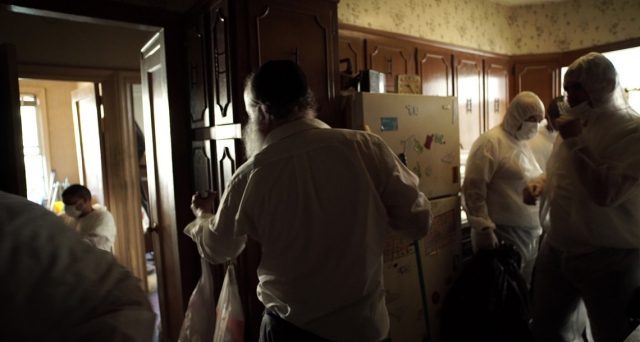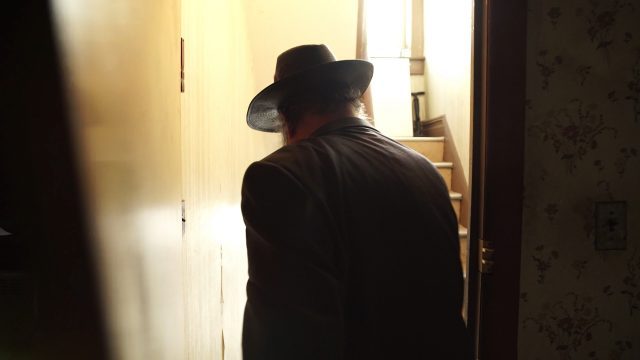
A cleaning crew has its work cut out for it in Alex Lora and Antonio Tibaldi’s Thy Father’s Chair
THY FATHER’S CHAIR (Alex Lora & Antonio Tibaldi, 2015)
Village East Cinema
181-189 Second Ave. at 12th St.
Opens Friday, October 13
212-529-6998
www.citycinemas.com
 Directors Antonio Tibaldi and Alex Lora put the viewer right in the middle of twin brothers Abraham and Shraga’s desperately crowded and traumatic situation in the compulsively watchable observational documentary Thy Father’s Chair. After their parents died, the slovenly, unmarried Jewish scholars just plain stopped cleaning up after themselves, allowing newspapers, magazines, food, garbage, kitty litter, and myriad other items to pile up around them. They were not collectors hoarding valuable possessions or personal mementos; they were simply unable to organize anything or throw stuff away in their Brooklyn apartment. Only when their upstairs tenant stopped paying rent in protest, demanding they clean their place — the tenants had to deal not only with bad odors from the brothers’ apartment but with vermin as well — do they seek out assistance, hiring an Israeli man named Hanan of Home Clean Home to come and make their apartment safe and livable again. But it’s no easy task, as Abraham watches Hanan and his hazmat-suited team very carefully, continually trying to talk them out of tossing away certain items HCH insists must go; meanwhile, Shraga just moans on and on as he downs bottles of wine. (One of the only ways to tell the identical twins apart is by the wine stains on Shraga’s white shirt.)
Directors Antonio Tibaldi and Alex Lora put the viewer right in the middle of twin brothers Abraham and Shraga’s desperately crowded and traumatic situation in the compulsively watchable observational documentary Thy Father’s Chair. After their parents died, the slovenly, unmarried Jewish scholars just plain stopped cleaning up after themselves, allowing newspapers, magazines, food, garbage, kitty litter, and myriad other items to pile up around them. They were not collectors hoarding valuable possessions or personal mementos; they were simply unable to organize anything or throw stuff away in their Brooklyn apartment. Only when their upstairs tenant stopped paying rent in protest, demanding they clean their place — the tenants had to deal not only with bad odors from the brothers’ apartment but with vermin as well — do they seek out assistance, hiring an Israeli man named Hanan of Home Clean Home to come and make their apartment safe and livable again. But it’s no easy task, as Abraham watches Hanan and his hazmat-suited team very carefully, continually trying to talk them out of tossing away certain items HCH insists must go; meanwhile, Shraga just moans on and on as he downs bottles of wine. (One of the only ways to tell the identical twins apart is by the wine stains on Shraga’s white shirt.)
“What the hell! Nobody’s helping me,” Abraham cries out. “We are here to help you!” Hanan says. “You’re not going to help me. You’re going to tell me what to do,” Abraham replies. Later, Abraham tells Hanan, “What is it, a punishment?” Hanan responds, “It’s not punishment. I’m trying to help you; you’re not working with me.” Abraham just can’t bear to get rid of what is clearly mostly junk and garbage, including vastly outdated electronic equipment and canned food. The only item that the brothers search for that is indeed worth keeping is their megillah scroll, but that is the exception. Abraham also agonizes over his father’s favorite chair, not wanting Hanan to take it yet debating whether he is even worthy enough to sit in it. “The Torah wants everything to be clean, but unfortunately we veered from it,” he concedes. The brothers actually do understand what is going on, that their hoarding is patently absurd and dangerous, but they are powerless to stop it.

Documentary focuses on Brooklyn twin brothers who have serious hoarding problem
Director and cinematographer Tibaldi and director and editor Lora cast no judgment on the two men; the filmmakers work, much like the Maysles brothers did, like flies on the wall, recording the crazy things going on in this railroad apartment in Midwood for eight days. Complicating matters, Tibaldi couldn’t always get the kinds of shots he wanted, as he was physically limited as to where he could stand because of the mounds of filth. There’s no back story; we find out almost nothing about who Abraham and Shraga are and what they have done with their lives, what their hopes and dreams might have been, other than what little they reveal of themselves onscreen, which is dominated by an overwhelming fear of things being taken away from them. There are also no talking heads offering expert opinions or psychological evaluations about the brothers and their situation.
Both melancholic and absurdly funny, the twins’ predicament is sort of what would happen if the Beale women of Grey Gardens had mated with Homer Lusk Collyer and Langley Wakeman Collyer, the famous hoarding brothers who died less than two weeks apart in their Harlem brownstone, no longer able to survive their suffocating surroundings. Bjarke Kolerus and Simon Don Eriksen’s gentle music also doesn’t comment on the ridiculousness of it all, instead treating it with understanding. “I feel sorry and sad to see you sad,” Hannan tells Abraham, who replies, “I feel bad about the stuff that’s being thrown out, but it has to be done,” trying to convince himself that it’s all going to be okay. The Father’s Chair, which is dedicated to Chantal Akerman, opens Friday, October 13, at the Village East and will be preceded by Artemis Shaw and Alexander Lewis’s 2016 short Single Room Occupancy.